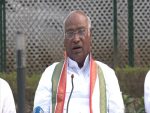
Will Russia push Biden on a path of techno-nationalism?
PTI, May 12, 2022, 8:53 AM IST

Pensacola: US President Joe Biden is attempting to unravel the tone of the Trump administration, but his actions don’t always match his words.
When US Indo-Pacific Commander Admiral John Aquilino spent his April seeking to deepen regional strategic ties, technology figured prominently on this agenda.
In India, he emphasised “integrated deterrence”, a recent US push to share more technological capabilities and security operations with partners.
In Australia, he visited the joint US-Australia spy satellite facility at Pine Gap. The site exemplifies US efforts to extend technological integration with partner governments.
Aquilino’s agenda was inspired partly by Russia’s invasion of Ukraine, an act that has reinvigorated US President Joe Biden’s commitment to supporting partners and allies. And yet Biden’s strategic agenda remains a mix of nationalism and internationalism, embodying long-running US tensions between techno-nationalist policy and internationalist cooperation.
One of the US Senate’s youngest-ever members, Biden absorbed the chamber’s ethos of collaboration, deal-making, and mutual benefit. A cold warrior for 20 years but rarely a standout hardliner, he championed deals for nuclear arms reductions and boosted the liberal postwar order.
In this strategic framework, international alliances and organisations married US military dominance and economic integration. It proved a winning strategy by the late 1980s. Biden never forgot the lesson.
Despite this, Biden’s team has also carried forward some of the Trump administration’s hard line on trade and technology transfer to China and Russia. And with supply chain pressures exposed by COVID-19, talk of greater national self-sufficiency has grown.
Biden sees emerging technologies and technology-heavy sectors in terms of jobs and self-reliance. He also worries that a great-power competitor like China might steal a march on US industry and national defence.
Russia’s invasion of Ukraine activated his muscle memory: contain Moscow, avoid escalation, actively support partners and allies, leverage US dominance in the global economic and political system.
To his Indian counterparts, Aquilino described the war as “a violation of the international rules-based order. It is an attack on sovereignty and integrity.” In a classic study of Japanese modernisation, Richard Samuels found that the country’s early 20th century strategists saw economic growth and national security naturally linked through technological prowess.
Even after World War II, policies emphasised relative technological self-sufficiency and dual-use investments for corporate and military capacity.
The Biden team’s approach embodies these urges. Senior US officials across the Trump and Biden administrations have found themselves reaching for what might be termed ‘techno-nationalism’.
For Biden, liberal integration is geopolitically important, and technological co-operation is a key pillar of that platform. His administration’s push for greater co-operation ranges from military operations to the AUKUS deal to cyberspace coordination with a wide range of governments.
In late 2021, US officials formally adopted “integrated deterrence”. The concept remains hazy, however US strategic planners appear to be aiming toward deeper co-operation with allies who might help deter a rising China. Technical integration would play a key role in this approach.
In April 2021, at the University of South Florida’s biannual Great Power Competition Conference, a cadre of the United States’ top national security professionals grappled with cybersecurity in the shadow of the SolarWinds hack of US government systems, one of the “largest and most sophisticated” ever.
The professionals agreed that cybersecurity is an asymmetric challenge: adversaries have strong incentives to attack systems and infrastructure, and face few serious consequences. Policy responses aim to shift those adversaries’ cost-benefit calculations. But how? Many reached for a catch-all: “collective defence”. It is a classic internationalist concept implying close collaboration with partners and allies in response to threats. But security professionals at this event referred only vaguely to international co-operation. For them, the real core of cybersecurity collective defence seemed to be arranging responses across domestic government and private actors.
In short, cybersecurity is a classic internationalised challenge, but under pressure, national security professionals reached for national solutions.
During the Trump years, officials had already pushed in this direction. Trump himself devoted little attention to cybersecurity, but he cast US strategic priorities in a markedly nationalist mould.
In this environment, senior US strategists like Paul Nakasone, advocated a “defend forward” posture. This would involve proactively collecting intelligence on other nations’ capabilities and developing capacity to actively counter those threats.
The push emphasises US national capabilities and US talent. US planners remain alarmed by their own struggle to maintain internal cyberspace cohesion. Working with foreign partners, no matter the tactical and ideological benefits, may remain on the wish-list more than the must-have agenda.
Within days of taking office, the Biden administration initiated a policy review to press government agencies on acquisition of “Made in America” services, hardware, and computer technology.
Another order activated a review of critical materials, agricultural, and manufacturing resilience alongside cybersecurity risks. SolarWinds triggered a cascade of executive orders.
In June 2021, Biden revoked Trump’s blanket ban on specific Chinese-owned smartphone applications; yet, the order explicitly reaffirmed the Trump language about national security threats and the dangers of unguarded supply chains. In all these moves, Biden seemed to shift the tone, not the underlying logic of the Trump administration’s approach.
Yet another Biden executive order cast a broad agenda to “improve the nation’s cybersecurity”.
It included processes to create “baseline security standards” for software purchased by the US government and to develop an energy star-type designation “so the government – and the public at large – can quickly determine whether software was developed securely”.
After reviewing critical energy infrastructure, the White House also released a national security memorandum, updating and clarifying methods for the federal government and private industry to “monitor control systems to detect malicious [cyber] activity” and then to share information and coordinate response practices.
For some observers, the Biden failure to choose between nationalism and internationalism shows US foreign policy to be unserious about great power competition.
Whatever the case, sensible actions in themselves, each policy step to secure technological exposure further emphasises national self-sufficiency.
Biden and his team embrace international partnership, US military strategy values integrated deterrence, yet US technological exposure is sprawling, and the pressure to act is immediate.
Accountable to constituents and his own ideological history, Biden embraces diplomatic co-operation but often ends with operational nationalism.
(By Jacob Shively, University of West Florida Pensacola. The Conversation)
Udayavani is now on Telegram. Click here to join our channel and stay updated with the latest news.
Top News
Related Articles More

LS 2024: Yet another face-off between seasoned politicians Kota Srinivas Poojary & Jayaprakash Hegde

Wish to work for betterment of my state Odisha: UPSC 2nd rank holder Animesh Pradhan
Climate change is causing marine ‘coldwaves’ too, killing wildlife

Celebrating Vishu: A Tapestry of Traditions Across India

‘Sangh values’ run through my veins; can’t think of filling mother’s shoes: Bansuri Swaraj
MUST WATCH
Latest Additions

Gadag: 4 of a family brutally murdered by home intruders

Four of family found murdered in Gadag

LS polls phase 1: Voting underway in 102 seats, leaders urge people to turn up in large numbers

Fight to protect our Constitution and democracy begins today Kharge on LS polls

Aamir Khan deepfake video: Mumbai Police registers FIR against unnamed person























